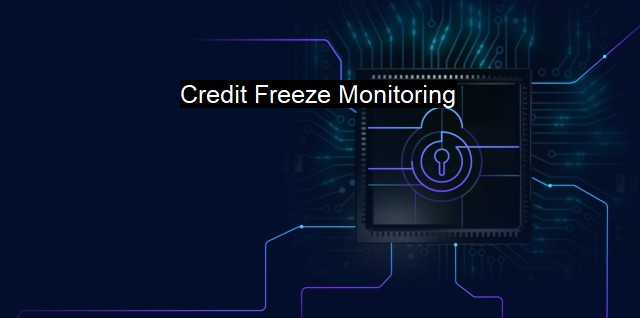What is Credit Freeze Monitoring?
Protecting Your Finances with Credit Freeze Monitoring: Understanding its Benefits in the Modern Era of Cybersecurity and Antivirus
Credit Freeze Monitoring, as it pertains to cybersecurity and antivirus protection, is a process that involves restricting access to a consumer's credit report for the primary purpose of preventing identity theft and other forms of online fraud. It works as an essential aspect of cybersecurity solutions aimed at securing personal data stored in credit accounts. This system safeguards consumers against unauthorized access to their credit reports and significantly helps in preventing cyber criminals from fraudulently opening new accounts under their names.The process begins with freezing or ‘locking away’ the consumer's credit report at the three primary credit bureaus, namely: Equifax, Experian, and TransUnion. Post implementation of a credit freeze, these agencies will not release the individuals' credit reports without their explicit permissions. Hence, if a fraudster attempts to open a new line of credit using their details, the potential lender will be unable to access the credit report. Due to this, the credit application will likely be denied as the lenders usually require access to the applicant's credit report before granting any credits, deterring fraudulent attempts effectively.
Cybersecurity companies increasingly provide credit freeze monitoring as a part of their service to anticipate and respond to three key types of threats typically linked to one's credit records. The first type is "new account fraud," wherein hackers create an account in the user's name. The second category is "account takeover fraud," whereby attackers manipulate and control someone else’s existing account. The third sort involves the use of stealthy "synthetic identity fraud," where fraudsters create an entirely new and fraudulent identity utilizing both fake and legitimate details.
Antivirus solutions also can play a significant role when associated with credit freeze monitoring. Though credit freezes essentially form a strong reactive measure against harmful attacks, it's equally pivotal to take proactive measures against cyber threats. Thus, antivirus software becomes a indispensable tool. The software scans the computer and other devices, detects viruses, malware or spyware, removes them and protects important data that might include personal identification or credit file data. Some advanced antivirus solutions can provide real-time scanning, provide alerts even upon detecting minor suspicious activities, have very little latency, protect from phishing and warn users when they are being redirected to an untrustworthy website.
Simultaneously, cybersecurity systems club these solutions of antivirus software and credit freeze monitoring. This collaboration ensures a full range of protection covering all potential vulnerability points in order to detect breaches before they occur. Traditional antivirus software prevents, detects and removes unwanted files seen as threats, while credit freeze monitoring aids in limiting post-threat damage. By limiting access to the credit report following a threat, the user can maintain control over their credit information and inhibit further fraudulent activities.
In today's digital economy, identity theft has surfaced as a massive threat to both companies and consumers. Personal and financial data are harvested and exploited, making security breaches an increasingly common occurrence. Two-Step verification and biometric access are not always bulletproof countermeasures. Cybercriminals constantly innovate to overcome these security measures, forcing cybersecurity companies to continually upgrade and evolve their offerings.
Credit freeze monitoring acts as an additional layer of cybersecurity, which inhibits problems that might arise from identity theft. It ensures personal and financial data security not just from common viruses, but from advanced cyber threats that may lead to financial losses or personal damage. The collaboration of credit freeze monitoring and antivirus solutions, therefore, helps manage threats effectively but also shields the users from prospective malicious attacks.

Credit Freeze Monitoring FAQs
What is credit freeze monitoring?
Credit freeze monitoring is a service that helps detect any unauthorized attempts to access your credit report or open new accounts in your name. It involves placing a freeze on your credit report and monitoring any activity on it.How does credit freeze monitoring protect my cybersecurity?
Credit freeze monitoring prevents hackers and identity thieves from accessing your personal information and using it to commit fraud or identity theft. It also alerts you in real-time if any suspicious activity is detected.Do I need antivirus software if I have credit freeze monitoring?
Credit freeze monitoring and antivirus software serve different purposes in safeguarding your cybersecurity. Antivirus software protects your device from malware and viruses, while credit freeze monitoring protects your personal and financial information. It is recommended to use both for maximum protection.How can I sign up for credit freeze monitoring?
You can sign up for credit freeze monitoring through a credit monitoring service or directly through one of the three major credit bureaus. The process usually involves providing personal and financial information and paying a monthly fee.| | A | | | B | | | C | | | D | | | E | | | F | | | G | | | H | | | I | | | J | | | K | | | L | | | M | |
| | N | | | O | | | P | | | Q | | | R | | | S | | | T | | | U | | | V | | | W | | | X | | | Y | | | Z | |
| | 1 | | | 2 | | | 3 | | | 4 | | | 7 | | | 8 | | |||||||